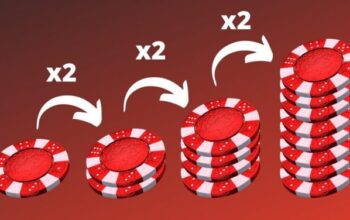A croupier, sometimes called a Chemin, is an attendant at a gaming table in a casino. The croupier typically stands behind the table and runs the game for players. The croupier works with other casino personnel such as pit bosses, dealers, and cashiers to ensure that players are playing fairly and that the game is being conducted per rules set forth by law or contract.
A croupier’s responsibilities include dealing cards, collecting and paying out winning bets, managing the game’s bank, and verifying that players are playing the game correctly. This is done by looking at a “layout,” which displays all pertinent information about a game’s bets, such as what type of bet has been placed or whether a player has made his or her bet. Get know if card counting is illegal.
What does a croupier do in a casino?
The following are 10 responsibilities of a croupier:
1. Dealing Cards
Croupiers typically deal out the cards at a gaming table. The position of a croupier is very methodical, as they must ensure that both players have received their cards and their opponent’s cards. The croupier works with the pit boss, player, and dealer to set most of the cards to be dealt back. This includes how many cards are dealt face up to how many are dealt face down. The croupier must also ensure that no cheating occurs, such as moving a card before it is dealt with or putting the wrong bets on the table.
2. Collecting & Paying out Winning Bets
The croupier is the player’s primary source of cash. They collect the winning bets and place them into a bank. The croupier then accounts for the total amount of the bank at the end of every hand. When in doubt, they keep it simple: they only accept what is commonly known as “the house” money, which consists of chips given to them by the pit boss or casino itself. While a croupier is typically in charge of dealing out the cards, he or she often ensures that winning bets are paid out to winners. The croupier is responsible for collecting winning bets and distributing them to the pit boss or dealer. The croupier then informs other personnel of the amount collected.
3. Managing a Game’s Bank
The croupier must ensure that the game’s bank is maintained. This means that they update the bank and ensure they have enough money to cover all of the bets at the table. They also verify that the amount of money in the bank matches what is on the layout, so players will not be cheated out of their winnings if their cards are changed at any point during play.
4. Verifying that Players are Playing the Game Correctly
The croupier must make sure that all players are playing the game correctly. This is especially important if a house edge is associated with the game being played. For instance, if the house edge for craps is 2%, the croupier must verify that all players are playing by what their cards say and that they are not cheating.
For example, if a player uses more than one card, the croupier must ensure that both cards have equal odds of winning at any given time. If the croupier notices that a player is using their cards incorrectly, it is their job to inform the pit boss and dealer. Also be on the watchout on those doing card counting.
5. Maintaining Order and Discipline at the Table
They monitor players to ensure they are not cheating and table players are not disruptive, fighting, or violating house rules. They make sure that this is done fairly and consistently. If a player violates any rules, the croupier will alert other casino personnel, such as the pit boss, so that they can correct the situation. Croupiers make it clear to players that house rules are in place for a reason: to ensure a fun and fair experience for all involved.
6. Scheduling Rounds or other Events in Advance
Croupiers must ensure that all events that are taking place are scheduled in advance. This means they must schedule any events that will take place during a given round, such as when to begin, how long the break will be, and how long the table will be open. This can include things like: when to start each betting round (or period), when players can check their cards, and when the game is going to end. The croupier should also ensure that there are scheduled breaks between rounds or play periods.
7. Completing Required Paperwork
Croupiers must keep accurate records of all tables, including table numbers and the amounts in their banks. They must also fill out paperwork to account for each betting round or period. This includes an official record of the bets placed during a given round and the total amount of bets in the bank at the end of each round. For instance, if a player requested a payout, this is also noted. Additionally, croupiers must fill out a dead chip report if they notice that any of the casino’s chips are missing or being used without authorization.
8. Providing Gaming Information and House Rules
Croupiers must ensure that all players at their table know the game’s rules and any other rules that apply to the table. They also inform players about what is going on in the casino and why certain events happen inside and outside of a game. Croupiers should know the rules that apply to the specific games being played at their table, including how much players can win and what is at stake.
9. Communicating with Pit Boss and Dealer
Croupiers must inform the pit boss and the dealer when anything significant is happening at their table. This can include a lost bet (designed to discourage betting while they try to game the system), a malfunctioning machine, or anything that may change the game’s rules. This includes when players check their cards, how much money is in the bank, or when an event will happen.
10. Exiting the Table
A croupier must ensure that the player’s bank is cleared after a round or event. This means that the player’s winnings must be removed from their account and sent to the pit boss. They also ensure the dealer is finished with their work, such as counting their chips or stowing them away. They should then walk to their station, so they will be present at the next hand of play and can exchange shifts with another croupier if required.
Conclusion
Croupiers are an integral part of the casino. They prevent cheating, maintain order at their table, keep records, and much more. By playing a key role in ensuring the casinos function smoothly in general and the games are fair, the croupier can help to ensure that all gamblers have fun even to who play spin and win prizes. They ensure that all players know the rules and help keep things fair for everyone involved.





